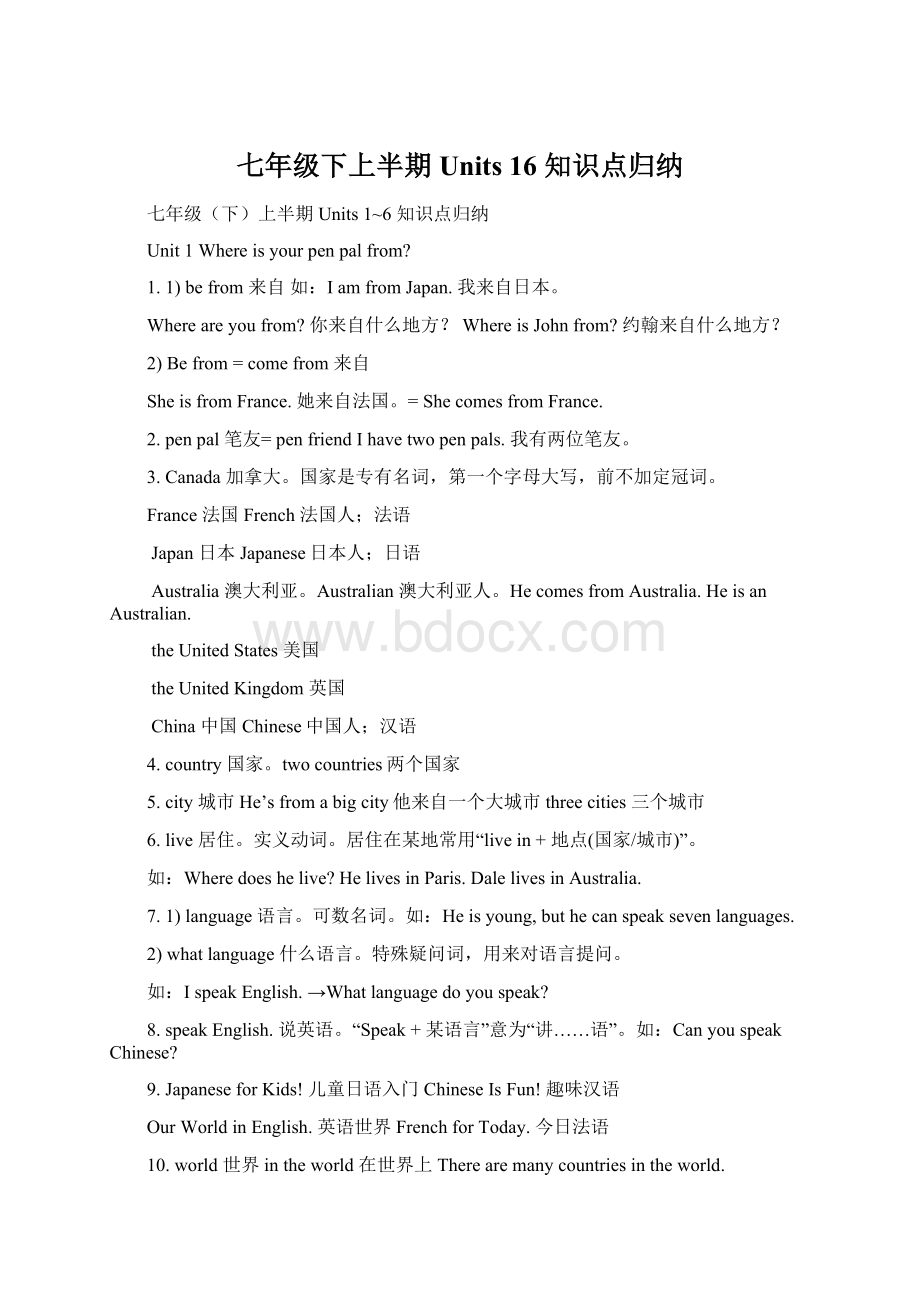七年级下上半期Units 16 知识点归纳.docx
《七年级下上半期Units 16 知识点归纳.docx》由会员分享,可在线阅读,更多相关《七年级下上半期Units 16 知识点归纳.docx(27页珍藏版)》请在冰豆网上搜索。

七年级下上半期Units16知识点归纳
七年级(下)上半期Units1~6知识点归纳
Unit1Whereisyourpenpalfrom?
1.1)befrom来自如:
IamfromJapan.我来自日本。
Whereareyoufrom?
你来自什么地方?
WhereisJohnfrom?
约翰来自什么地方?
2)Befrom=comefrom来自
SheisfromFrance.她来自法国。
=ShecomesfromFrance.
2.penpal笔友=penfriendIhavetwopenpals.我有两位笔友。
3.Canada加拿大。
国家是专有名词,第一个字母大写,前不加定冠词。
France法国French法国人;法语
Japan日本Japanese日本人;日语
Australia澳大利亚。
Australian澳大利亚人。
HecomesfromAustralia.HeisanAustralian.
theUnitedStates美国
theUnitedKingdom英国
China中国Chinese中国人;汉语
4.country国家。
twocountries两个国家
5.city城市He’sfromabigcity他来自一个大城市threecities三个城市
6.live居住。
实义动词。
居住在某地常用“livein+地点(国家/城市)”。
如:
Wheredoeshelive?
HelivesinParis.DalelivesinAustralia.
7.1)language语言。
可数名词。
如:
Heisyoung,buthecanspeaksevenlanguages.
2)whatlanguage什么语言。
特殊疑问词,用来对语言提问。
如:
IspeakEnglish.→Whatlanguagedoyouspeak?
8.speakEnglish.说英语。
“Speak+某语言”意为“讲……语”。
如:
CanyouspeakChinese?
9.JapaneseforKids!
儿童日语入门ChineseIsFun!
趣味汉语
OurWorldinEnglish.英语世界FrenchforToday.今日法语
10.world世界intheworld在世界上Therearemanycountriesintheworld.
11.some/any一些
some:
肯定句。
在表请求、建议等语气时可用于疑问句。
Hehassomebrothers.
any:
疑问句和否定句。
Doeshehaveanybrothers?
Hedoesn’thaveanybrothers.
12.herfavoritesubject她最喜欢的学科。
13.IliveinToronto,Canada.我住在加拿大的多伦多。
英语中小单位在前,大单位在后。
如:
IliveinGuiyang,Guizhou.IaminClass1,Grade1.我在一年级一班。
14.IwantapenpalinChina.我想在中国找一位笔友
15.aninterestingcountry一个有趣的国家。
aninterestingbook一本有趣的书。
16.14yearsold十四岁
17.alittle一点。
可修饰语言。
如:
HecanspeakalittleJapanese.他会说点日语。
18.Ilikegoingtothemovies.我喜欢去看电影。
Likedoingsth喜欢干某事。
如:
Helikeslisteningtomusic.他喜欢听音乐。
19.and连接两个对等的并列成份。
如:
Helikesrunningandplayingbasketball.
20.It’stoodifficult.那太难了。
too“太……”。
暗含过分的意思。
后接形容词或副词。
如:
Thetableistoobig.这桌子太大了。
21.Canyouwritetomesoon?
你能很快给我回信吗
writetosb=writealettertosb写信给某人。
22.penpalwanted寻求笔友。
23.onweekends在周末
24.Pleasewriteandtellmeaboutyourself.请写信告诉我有关你自己的情况。
Tellsbaboutsth告诉某人有关……的情况。
如:
Pleasetellmeaboutyourfamily.请告诉我有关你家里的情况。
25.dislike厌恶;不喜欢。
反义词是like。
likeanddislike好恶;爱憎。
Unit2Where'sthepostoffice?
1.library图书馆。
其复数为libraries.如:
twolibraries两个图书馆
2.bank银行;河岸
【ThebankofChina中国银行Ariverhastwobanks.一条河有两个岸。
】
3.Istherea…nearhere?
附近有一个……吗?
常用来问路。
如:
Isthereabanknearhere?
It’sonCenterStreet.它在中央大街。
4.在街上美国英语常用on.(英国英语用in)如:
ThereisarestaurantonBridgeStreet.
5.acrossfrom在……对面=ontheothersideof
如:
Thehouseisacrossfromthestreet.=Thehouseisontheothersideofthestreet.
6.nextto紧挨;邻近。
如:
Hesitsnexttome.他紧挨着我坐。
7.between…and……与……之间。
用于两者之间,注意用宾格。
如:
HeisbetweenTomandme.他在我和汤姆之间。
8.infrontof在……前面(物体外部)如:
Thereisatreeinfrontofourclassroom.我们教室前有一棵树。
(树在教室外)
【比较:
Inthefrontof在……前面。
(物体内部)。
如:
Thereisadeskinthefrontofourclassroom.我们教室前有一张桌子。
(教室内部)
9.behind在……后面。
方位介词。
如:
behindthechair.在椅子后。
10.FifthAvenue.第五大街。
专有名词,前不用定冠词the。
11.询问地点用Where’s+地点?
回答用It’s…如:
Where’sthesupermarket?
It’sonCenterStreet.
12.Excuseme对不起;打扰了;请原谅。
比较:
Excuseme/sorry.前者为客套语,常用于“向人问路”、“要离开(会场,活动等)”、“插话”、“请求许可”、“向对方询问情况,可能引起对方不快等场合。
”
Sorry侧重于事后对所犯的过错或不能满足对方要求而向对方表示歉意的场合。
13.intheneighborhood在附近Thereisaparkintheneighborhood.附近有一个公园。
14.Just用在祈使句中,意为:
“就请……吧;尽管……好了”。
如:
Justletmehelpyou.
15.gostraight一直走。
Straight“一直”,副词,放动词后,常用于指示方向。
如:
gostraightdowntheroad.沿着这条路走下去。
16.turnleft/right向左/右转。
Turnleft/rightatthe…turning/crossing.在第个路口向左/右转。
如:
Turnrightatthefirstcrossing.在第一个路口向右转。
Turnleft/righton/at+街道(地点)。
在某地向左/右转。
如:
TurnleftatNewPark.在新公园向左转。
TurnrightonGreenStreet.在格林大街向右转。
17.down1)副词。
“向下,下去”。
位于动词后。
如:
sitdown坐下
2)介词。
“沿着”。
如:
Godownthisstreet.沿着这条街走。
18.ontheleft/right在左/右边。
Thereisasupermarketontheleft.在左边有一家超市。
onone’sleft/right在某人的左/右边。
LucysitsonLily’sright.露西坐在莉莉右边
ontheleft/rightof…在……的左右边Youcanseeaschoolontherightofthebank.
19.Thankyouverymuch.非常感谢。
=Thanksalot.
回答:
You’rewelcome.别客气;不用谢。
20.几组反义词:
new—oldsmall—bigdirty—clean
busy—free空闲的(指街道时可用quiet)
busy忙的常用短语有:
bebusywithsth忙于某事bebusydoingsth忙于做某事。
如:
Theboyisbusywithhishomework.这男孩忙于他的作业。
Billisbusyplayingtheguitar.比尔正忙于弹吉他
21.anoldhotel一家旧旅馆。
注意old前an用。
如:
anoldphoto一张旧照片。
22.Welcometo+地点。
欢迎到某地。
如:
Welcometoourschool.欢迎到我们学校。
WelcometoChina.欢迎到中国来。
★如果地点是副词,则省掉to。
如:
Welcomehome.欢迎到家。
23.enjoy享受……的乐趣;欣赏。
如:
TheyenjoyChinesefoodverymuch.
enjoydoingsth.喜欢做某事=likedoingsthDianaenjoyswatchingTV.戴安娜喜欢看电视。
24.quiet宁静的如:
Bequiet请安静。
Pleasekeepquiet.请保持安静。
25.takeawalk=haveawalk散步Let’stakeawalkafterdinner.让我们晚饭后散会步吧。
26.区分across/through/over
across指从一定范围的一边到另一边。
动作是在物体的表面进行。
常用于横穿街道、河流,穿过桥梁等。
如:
Theywalkacrossthebridge.他们步行走过了这座桥。
through侧重从物体的内部空间穿过,动作是在物体内部进行。
常用于门、窗户、森林等。
如:
Hewalksthroughthepark.他步行穿过公园。
Over多指从物体上空通过。
如:
Thebirdsflyoverthecity.鸟儿从城市上空飞过。
27.Acrossfromtheparkisanoldhotel.公园对面是一家旧旅馆。
这是一个倒装句。
正确语序是:
Anoldhotelisacrossfromthepark.这儿把介词短语提前,表强调。
注意动词与主语一致而不是与介词短语一致。
如:
Underthetablearetwoballs.桌子下有两个球。
28.…asmallhousewithaninterestinggarden.一个有着有趣花园的小房屋。
with①“具有、带有”。
如:
Chinaisacountrywithalonghistory.中国是一个历史优久的国家。
Hissisterisanicegirlwithtwobigeyes.他的妹妹是一位有着一双大眼睛的漂亮姑娘。
②“和某人一起”如:
Shewantstogowithus.她想和我们一起去。
29.thebeginningof………的开始。
如:
That’sthebeginningofhisnewlife.那是他新生活的开始。
【Atthebeginningof…在……的开始。
如:
Atthebeginningoftheclass,theteachertellusastory.开始上课时,老师给我们讲了一个故事。
】
30.agoodplacetodosth.一个做某事的好地方。
如:
Ourclassroomisagoodplacetostudy.我们教室是一个学习的好地方。
31.havefun玩得开心。
=haveagoodtime=enjoy+反身代词。
如:
WehavefunonSundays.=WehaveagoodtimeonSundays.=WeenjoyourselvesonSundays.
【Havefun(in)doingsth做某事很愉快。
WehavefunlearningEnglishthisterm.】
32.Ifyouarehungry,youcanbuysomefoodinthesupermarket.如果你饿了,你可以在超市买食物。
If“如果”。
引导的句子称“条件状语从句”。
如:
Ifyouarehungry,pleasegotoyourmother.
33.△“begoingto+动词原形”表示“计划做某事、将要做某事”。
如:
Wearegoingtoplaybasketballthisafternoon.今天下午我们要打篮球。
34.from…to…从……到……。
如:
fromonetoten从一到十
WegotoschoolfromMondaytoSaturday.我们从星期一到星期六上学。
35.arrive“到达”不及物动词。
arriveat/in=getto
到达小地方用arriveat,如车站、码头等。
到达大地方用arrivein,如城市、国家等。
如:
TheyarriveinShanghaitoday.Ifyouarriveatthehotel,pleasecallme.
如:
Igettoschoolatseveneveryday.=Iarriveatschoolatseveneveryday.
bearriving“就要到达、将要到达”。
如:
Heisarrivingnextweek.他下周就要来了。
36.nextSunday下周星期天。
next“下一的”如:
nextweek下周nextyear明年
37.Letsbdosth让某人干某事。
38.thewayto…去……的路。
如:
Doyouknowthewaytothebank?
你知道去银行的路吗?
Idon’tknowthewaytoyourhouse.我不知道去你家的路。
39.takeataxi=haveataxi乘出租车
40.pass经过;通过(考试、检测等)如:
Youwillpassabigsupermarket.
Canyoupasstheexam?
你能通过考试吗?
41.godown=goalong沿着……走。
如:
GodownLongStreet.沿着长街走。
42.Whenyouseeabigsupermarket,当你见到一个大的超市时。
When“当……时候”。
如:
Whenyoufinish(完成)yourhomework,gohome.当你完成了作业,就回家吧。
43.Ihope+句子。
我希望…;我祝愿…如:
Ihopeyouhaveagoodweekend.祝你周末愉快。
语法知识:
Therebe句型:
(1)用法:
“某地存在某物/人”即强调某人或某物与某地的位置关系。
(2)结构:
“Therebe+主语+介词短语”
存在(有)某人/物某地
说明1:
(就近原则)Therebe有Thereis/Thereare两种形式。
由最近一个主语来决定be的单复数。
当最近一个主语为单数或不可数名词时,用Thereis;为复数时,用Thereare。
如:
Thereisabookonthedesk.Therearesometreesneartheriver.河的附近有一些树。
说明2:
“介词短语”表示“地点”,即上册所讲的“方位介词”。
也可把介词短语置于句首。
学过的有:
oninunderbetween(…and)nexttobehindinfrontof如:
Thereisaclockonthewall.Underthetreetherearesomegirls.
(3)Therebe句型的一般疑问句及其回答。
一般疑问句把be动词提前。
如:
Isthereaneggonthedesk?
Yes,thereis/No,thereisn’t.Arethereanybirdsinthetree?
(4)Therebe句型的否定句。
直接在be动词后加not.如:
Therearen’tanybooksonthedesk.
(5)对Therebe句型中的方位介词短语提问时,常用where.
如:
ThereisaparkonGreenStreet.→Whereisapark?
(去掉there)
(6)对therebe句型中的主语提问时,常省略there。
如:
Thereisadeskintheteacher’sroom.→What’sintheteacher’sroom?
Therearetwopensinthepencilcase.→What’sinthepencilcase?
(注意常用单数)
(7)Therebe句型与have的区别:
前者强调的是一种位置关系;have强调的是一种所属关系。
如:
Thereisapenonmydesk.我桌子上有一支笔。
(笔在我桌子上,但不一定是我的。
)
Ihaveapen.我有一支笔。
(不管笔在哪,都是属于我的。
)
Unit3Whydoyoulikekoalabears?
1、kindof有点,稍微Koalabearsarekindofshy.考拉有点害羞。
2、Chinan.中国African.非洲都是专有名词,首字母都应该大写,而且和介词in连用。
TherearemanykindsoftigersinChina.TherearemanykindsofscaryanimalsinAfrica.
3、friendlyadj.友好的,和蔼可亲的
☆它是名词friend的形容词形式,常常和be动词连用,befriendlytosb“对…友好”
ThepeopleinGuiyangareveryfriendly.
4、withprep.跟,同,和…在一起Iusuallyplaychesswithher.(with后跟宾语)
★注意区别与and的用法,and通常用于连接主语或宾语,连接主语时,如果有I,I通常放在and之后,如:
MyfatherandIusuallyplaychesstogether.
playwith“和…一起玩耍”“玩…”Ioftenplaywithmypetdog.Don’tplaywithwater!
5、day和night是一对反义词,day表示白天或一天,night表示夜或夜晚。
★通常说intheday,duringtheday,atnight。
如:
Koalabearsoftensleepduringthedayandeatleavesatnight.
6、leafn.叶子复数形式为:
leaves,类似的变化还有:
thief–thieves
7、hourn.小时;点钟hour前边通常加上冠词an表示“一个小时”,即:
☆anhour。
Thereare24hoursinadayand60minutesinanhour.
8、befrom来自…befrom=comefromPandasarefromChina.=PandascomeformChina.
9、meatn.(食用的)肉,不可数名词,表示“许多”时,使用much来修饰,即:
muchmeat
如:
Heeatsmuchmeateveryday.
10、grassn.草,为不可数名词,表示“许多”时,使用much来修饰,即:
muchgrass。
如:
Thereismuchgrassontheplayground.eatgrass
Unit4Iwanttobeanactor.
1.Iwanttobeanactor.我想成为一名演员。
“wanttobe+职业”表示“想成为一名……”
如:
Iwanttobeadoctor.我想成为一名医生。
Hewantstobeateacher.他想成为一名教师。
★want用法:
1)wantsthIwantabasketball.
2)wanttodosthIwanttoplaybasketball.
3)wantsbtodosth.Iwantyoutoplaybasketballwithme.
2.actor男演员